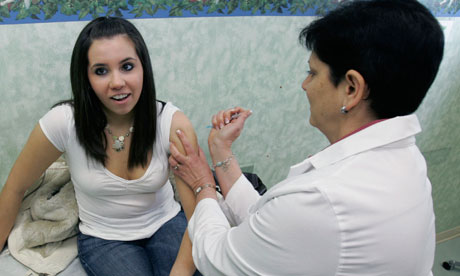
I remember when I first heard about a vaccine that could prevent against cervical cancer. Rather confusing – cervical cancer is not an infectious disease, but it's caused by a virus (HPV). So how does it work?
First of all, it is important to remind that most people have this sexually transmitted virus at some time in their lives – and unlike HIV, using a condom won't prevent it completely.
There are more than 100 types of HPV. Two of them – HPV 16 and 18 – cause around 70% of cervical cancer cases. HPV 16, the world's most common, is responsible for more than 50% of all cervical cancers in Europe. Other strains cause warts – including genital warts.
There are two vaccines that protect against those dangerous HPV strains: Cervarix, used in the UK, blocks HPV 16 and 18; whereas Gardasil protects against strains 6, 11, 16 and 18.
So the main difference between both vaccines is that Gardasil also protects against HPV 6 and 11, which cause most cases of genital warts. Although genital warts are not life threatening, they can cause various health problems - and cases are increasing among young people.
Now you wonder: if the UK Government could have chosen Gardasil, and given protection against both cervical cancer and warts, why did they choose Cervarix instead?
In 2008, the Joint Committee on Vaccination and Immunisation (JCVI) analysed the scientific evidence and it actually recommended the Department of Health to choose Gardasil, which would prevent genital warts as well as cervical cancer. But it also said the choice of vaccine should be determined by cost effectiveness, which depends on the negotiated cost of the vaccines. And as a result of this, the Government chose Cervarix instead.
Critics claim the choice was due to Cervarix's lower price proposed by British pharma company GlaxoSmithKline (GSK). The "cost-effective decision" will have saved the UK £18.6 million, according to a 2008 study.
I asked the Department of Health via a Freedom of Information (FOI) request, what were the estimated costs to supply the country with either Gardasil or Cervarix. But the information was considered too "commercially sensitive" to be disclosed.
The gross price per dose of Cervarix is £80.50, of Gardasil £86.50; GSK stated that making the net value of the contract available would enable their only HPV competitor (German Merck, which makes Gardasil) to be more competitive in other countries.
But the Department of Health might have retrospectively made the right choice – at least as far as cervical cancer is concerned. Even if this was ultimately a financial decision, research published subsequently in 2009 suggested that Cervarix could be more effective than Gardasil in preventing cervical cancer. As this table shows, Cervarix appears to offer cross-protection against other cancer-causing virus types, such as HPV 45 – even though it was only designed to protect against two strains.
Interestingly, another study published last year in The Lancet suggested that not only HPV types 16 and 18, but also 45 should be given priority in cancer prevention.
So according to the science, governments face the choice between high-quality cervical cancer prevention, or slightly less-effective cancer prevention but with the bonus of protecting against warts as well. Some UK doctors call for the latter.
Considering the future of the vaccine in the UK, I asked Dr Anne Szarewski, a clinical consultant at Cancer Research UK's Centre for Epidemiology, Mathematics and Statistics, if changing vaccines in the UK would be reasonable. "Foolish decision", she answered – we would no longer be able to distinguish between the two vaccines.
That's the UK story – but what about other countries? Does culture play a role in this decision?
"What's going to work for example in a Muslim society is not likely to
be the same in ours," Dr Szarewski said.
She explained why middle-eastern countries tend to favour Cervarix: "The thought that they're going to vaccinate women against a sexually transmitted disease, which those women are never supposed to get, is alien, whereas if you say to them 'vaccinate against cancer', then that's okay."
The United States and 122 other countries approved Gardasil.Nearly 100 countries, including all 27 European Union member states, have approved Cervarix.
But licensing, recommendation and actual usage of either the vaccines are another matter. I've been trying to track down which governments use which vaccine, but there doesn't seem to be any data available. Perhaps you could help me?
The debate on HPV vaccination carries on. Next week I'll be writing about the vaccination of men and boys, whether vaccination could prevent other types of HPV-related cancers, such as mouth, anal and penile cancers and examining the rationale for the recommended ages for taking the vaccines.
Débora Miranda is a science journalism MA student at City University London and is investigating these questions for her final project. All her source material is posted on her website cancer-screening.net. She can be contacted via email on cancerscreeningproject@gmail.com and on Twitter @debmir

